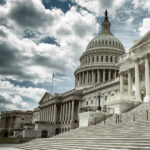On June 3rd, after the White House asked the D.C. Circuit Court of Appeals to place a stay on a May 29, 2025, district court ruling that temporarily blocked enforcement of President Trump’s emergency tariffs, arguing that the injunction would “irreparably harm the United States,” the District Court agreed to stay the injunction pending the disposition of the Administration’s appeal.
The District Court in Learning Resources Inc. et al. v. Trump et al. became the second court to rule against the Administration in the last week when it found on Thursday, May 29 that the International Economic Emergency Powers Act (“IEEPA”) did not authorize the President to impose tariffs. The Court issued a preliminary injunction blocking the collection of duties from the two plaintiffs that brought the case, Learning Resources, Inc. and hand2mind, Inc., both small businesses developing educational toys and products. The decision came just one day after the Court of International Trade (“CIT”) made a similar finding and blocked the IEEPA tariffs nationwide on May 28th. The White House immediately appealed that decision to the Court of Appeals for the Federal Circuit (“CAFC”) and filed Motions to Stay in both the CAFC and the CIT requesting a pause on the block pending the resolution of that appeal. The CAFC subsequently issued a stay of the CIT injunction on May 29th, and the CIT held the Motion to Stay filed before it in abeyance pending the resolution of the appellate proceedings.
In filings on June 2nd, the White House requested a similar stay of the D.C. Circuit decision, arguing that the injunction disrupts and risks “delicate, time-sensitive” discussions with trading partners. In declarations from Commerce Secretary Howard Lutnick, Secretary of State Marco Rubio, and Jamieson Greer, the Administration argued that the framework deal with the United Kingdom announced earlier in the month, as well as ongoing negotiations with dozens of similar foreign trading partners, are “premised on the credible threat of enforcement of the IEPPA tariffs.” Any ruling, the Administration argues, that “calls into question the President’s ability to impose the challenged tariffs” has “significant detrimental effects” on existing agreements and current negotiations. The White House had also argued that the government would suffer additional irreparable harm by “not receiving revenue it would have received had the tariffs been in effect.”
In its order granting the Administration’s motion to stay, the District Court stated that, in granting the preliminary injunction the previous week, it had “acknowledged the national security and foreign policy concerns” raised by the Administration, but had determined that any potential consequences would flow “if at all, from the CIT’s more sweeping order.” In light of the decision by the CAFC to stay the CIT injunction, the District Court determined that a stay of its own order was appropriate to protect against those potential harms.
The Learning Resources case and the CIT case now head to the D.C. Circuit Court and the Court of Appeals for the Federal Circuit, respectively, on appeal with the questions therein likely ultimately bound for the Supreme Court.

